合肥一中、六中、八中2019-2020学年高一上学期英语期末考试试卷
2019-2020学年合肥市一六八中学高三英语上学期期末试题及答案
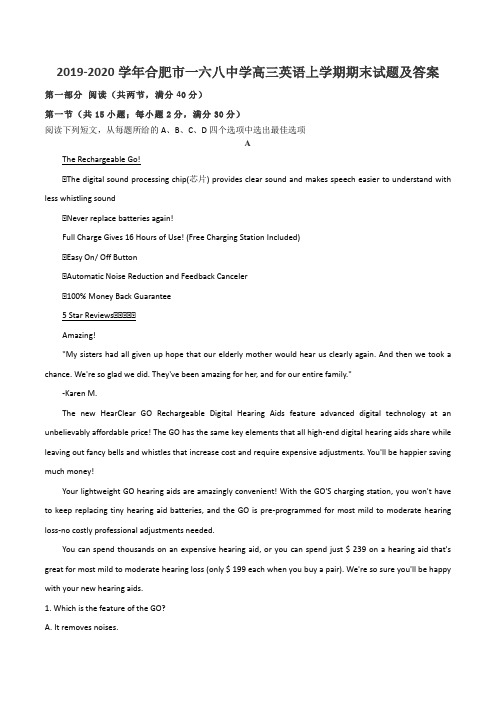
2019-2020学年合肥市一六八中学高三英语上学期期末试题及答案第一部分阅读(共两节,满分40分)第一节(共15小题;每小题2分,满分30分)阅读下列短文,从每题所给的A、B、C、D四个选项中选出最佳选项AThe Rechargeable Go!☑The digital sound processing chip(芯片) provides clear sound and makes speech easier to understand with less whistling sound☑Never replace batteries again!Full Charge Gives 16 Hours of Use! (Free Charging Station Included)☑Easy On/ Off Button☑Automatic Noise Reduction and Feedback Canceler☑100% Money Back Guarantee5 Star Reviews☑☑☑☑☑Amazing!"My sisters had all given up hope that our elderly mother would hear us clearly again. And then we took a chance. We're so glad we did. They've been amazing for her, and for our entire family."-Karen M.The new HearClear GO Rechargeable Digital Hearing Aids feature advanced digital technology at an unbelievably affordable price! The GO has the same key elements that all high-end digital hearing aids share while leaving out fancy bells and whistles that increase cost and require expensive adjustments. You'll be happier saving much money!Your lightweight GO hearing aids are amazingly convenient! With the GO'S charging station, you won't have to keep replacing tiny hearing aid batteries, and the GO is pre-programmed for most mild to moderate hearing loss-no costly professional adjustments needed.You can spend thousands on an expensive hearing aid, or you can spend just $ 239 on a hearing aid that's great for most mild to moderate hearing loss (only $ 199 each when you buy a pair). We're so sure you'll be happy with your new hearing aids.1. Which is the feature of the GO?A. It removes noises.B. It has separate on/ off buttons.C. It includes small batteries.D. It focuses on practical functions.2. Why does the author refer to Karen?A. To prove the GO's popularity.B. To explain the GO'S function.C. To convey the family's amazement.D. To show the GO'S high performance.3. How much do you pay for a pair of the GO?A. $ 199.B. $ 239.C. $ 398.D. $ 478.BLosing your ability to think and remember is pretty frightening. We know the risk of dementia (痴呆症) increases with age. But if you have memory slips you probably needn’t worry. There are pretty clear differences between signs of dementia and age-related memory loss.After age 50, it’s quite common to have trouble remembering the namesof people, places and things quickly, says Dr. Kirk Daffner of Brigham and Women’s Hospital inBoston.The brain ages just like the rest of the body. Certain parts become smaller, especially areas in the brain that are important to learning, memory and planning. Changes in brain cells can affect communication between different regions of the brain. And blood flow can be reduced as blood vessels narrow.Forgetting the name of an actor in a favorite movie, for example, is nothing to worry about. But if you forget the plot of the movie or don’t remember even seeing it, that’s far more concerning, Daffner says.When you forget entire experiences, he says, that’s “a red flag that something more serious may be involved”. Forgetting how to operate a familiar object like a microwave oven, or forgetting how to drive to the house of a friend you’ve visited many times before can also be signs of something going wrongBut even then, Daffner says, people shouldn’t panic. There are many things that can cause confusion andmemory loss, including health problems like temporary stoppage of breathing during sleep, high blood pressure, or depression, as well as medications (药物) like antidepressants.You don’t have to figure this out on your own. Daffner suggests going to your doctor to check on medications, health problems and other issues that could be affecting memory. And the best defense against memory loss is to try to prevent it by building up your brain’s cognitive(认知的) reserve, Daffner says.“Read books, go to movies, take on new hobbies or activities that force one to think in novel ways, ” he says. In other words, keep your brain busy and working. And also get physically active, because exercise is a known brain booster4. Why does the author say that one needn’t be concerned about memory slips?A. Not all of them are related to one’s age.B. Not all of them are symptoms of dementia.C. They occur only among certain groups of people.D. They are quite common among fifty-year-old people.5. Which memory-related symptom should people take seriouslyA. Totally forgetting how to do one’s daily routines.B. Inability to recall details of one’s life experiencesC. Failure to remember the names of movies or actorsD. Occasionally confusing the addresses of one’s friends.6. What should people do when signs of serious memory loss show up?A. Check the brain’s cognitive reserve.B. Stop medications affecting memory.C. Turn to a professional for assistance.D. Exercise to improve their well-being7. What is Dr. Daffner’s advice forfight against memory loss?A. Having regular physical and mental checkups.B. Taking medicine that helps boost one’s brain.C. Engaging in known memory repair activities.D. Staying active both physically and mentallyCScott and Daniel Harry are enjoying everyday tasks like shopping and washing for the first time following their move to an accommodation (住宿) support house in Kurwongbah, north of Brisbane last year.Disability Services Queensland’s Strengthening Non-Government Organisations project provided an accommodation support model that would enable residents (居住者) like Daniel and Scott to live more independently.The house is just one of many accommodation support services funded (资助)through the project. Thefive-bedroom house provides 24-hour care for up to four individuals with complex needs, including medical support. Care and staffing levels are varied and flexible, depending on each resident’s requirements.Scott and Daniel, who have a severe form of Duchenne Muscular Dystrophy, require 24-hour support in all activities of daily living. Before they moved to the house, they lived with their family. Scott says living at home was difficult as it placed a physical and emotional strain(负担) on their parents who had to wake them several times each night to reposition them or place them on breathing machines.“We were heavyhearted,” says Scott, who is planning to write a book about his life experiences. “But our parents now have a lot moretime for themselves. We now manage ourselves on a day-to-day basis.”Daniel is an enthusiastic gardener, taking care of his own vegetable garden. The men share the house with one other young man, and they go to rugby league games, meeting up with friends.Leeding Care Australia provides the care service at Kurwongbah. Manager Lee Garniss says setting up the facilities (设施) has not been without its challenges.“It is an unconventional model of care,” Lee says. “The home is Scott and Daniel’s home, however it is also a workplace for their support staff. Balancing these two requirements has been a challenge for all.”“We have experienced a bit of a learning phase over the last twelve months. However, by working as a team we try our best to meet the needs of both residents and staff and I think we have achieved the right balance.”8. What do we know about the house Scott and Daniel live in now?A. It was built by their parents.B. It can accommodate four residents.C. It belongs to a governmental project.D. It’s located in the center of Brisbane.9. Why did Scott and Daniel’s parents wake up frequently at night?A. To help them do exercise.B. They were making a lot of noise.C. To check on their breathing.D. They were under emotional pressure.10. How did Scott feel while living with his parents?A. A bit guilty.B. Quite happy.C. Very proud.D. Slightly angry.11. What was a challenge while setting up the facilities?A. Lack of fund.B. No workplace.C. Inexperienced staff members.D. Satisfying both staff and residents’ needs.DThe beach may seem like an inviting place to run on a cool summer morning, but is running on the sand good for your body? It can be, but it’s important to be aware of the challenges that some beach runners experience before you get ready.Running on the beach can be a good thing. It’s certainly different from running on a track or a pavement. For starters, sand can be a challenge because it has an uneven (不平坦的) surface. As you push off, you’re going to lose some of your push as the sand moves. So, you’re not going to be able to push yourself forward as you would on a track or a pavement. But this unevenness has anupside: It gives your body an extra workout, forcing you to exercise muscles that don’t get as much use during runs on firm surfaces. For example, your feet, ankles and lower back might feel sorer and more tired than usual after a beach run just because the surface is constantly moving and changing step to step.You also might feel sore afterward because beaches tend to slope (倾斜) down to the water. If you’re going for a long run on the beach, you might notice that one side of your body might feel sorer because you’re putting more pressure on it due to the slope.Some beach runners prefer to run barefoot — not wearing anything on feet. However, if you’re not used to barefoot running, start slowly and don’t run long distances at first. That’s because running barefoot uses more different muscles than running with shoes does, and it’s important to strengthen these muscles and adapt your feet. If you want to run barefoot and as long as you run carefully enough into it, go for it!Running on the sand can be a smart choice for you, because running on softer ground surfaces can reduce muscle damage.12. Why is it difficult to run on the beach for starters?A. The soft surface makes people fall over easily.B. People need to run carefully on its smooth surface.C. Running on its uneven surface takes much effort.D. It’s hard to keep one’s balance on its hard surface.13. Which of the following best explains “upside” underlined in Paragraph 2?A. Advantage.B. Reason.C. Character.D. Challenge.14. What’s the author’s attitude to barefoot running?A. Critical.B. Supportive.C. Doubtful.D. Uncaring.15. The passage can probably be found in ______.A. A primary school textbookB. A tourist guideC. A sports magazineD. A scientific report第二节(共5小题;每小题2分,满分10分)阅读下面短文,从短文后的选项中选出可以填入空白处的最佳选项。
2019-2020年高一上学期期末考试英语试题含答案
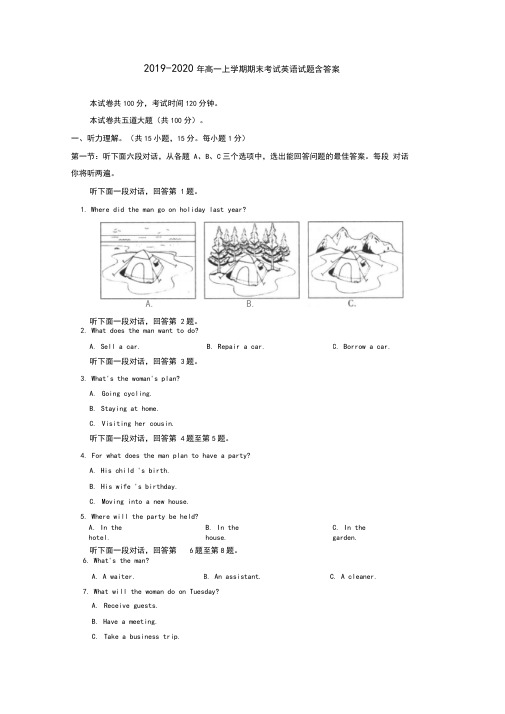
2019-2020年高一上学期期末考试英语试题含答案本试卷共100分,考试时间120分钟。
本试卷共五道大题(共100分)。
一、听力理解。
(共15小题,15分。
每小题1分)第一节:听下面六段对话,从各题 A 、B 、C 三个选项中,选出能回答问题的最佳答案。
每段 对话你将听两遍。
听下面一段对话,回答第 1题。
1. Where did the man go on holiday last year?2. What does the man want to do? A. Sell a car.B. Repair a car. 听下面一段对话,回答第 3题。
3. What's the woman's plan? A. Going cycling. B. Staying at home. C. Visiting her cousin.听下面一段对话,回答第 4题至第5题。
4. For what does the man plan to have a party? A. His child 's birth. B. His wife 's birthday. C. Moving into a new house.5. Where will the party be held?A. In thehotel. B. In the house. C. In the garden.6. What's the man? A. A waiter.7. What will the woman do on Tuesday? A. Receive guests. B. Have a meeting. C. Take a business trip.A.B.听下面一段对话,回答第 2题。
听下面一段对话,回答第6题至第8题。
C. Borrow a car.B. An assistant.C. A cleaner.8.When will the woman see Dr. Morgan?A.At 3 p.m. Friday.B.At 11 a.m. Thursday.C.At 4 p. m. Wednesday.听下面一段对话,回答第9题至第11题。
2019-2020学年合肥一中、六中、八中高一上学期英语期末考试试卷
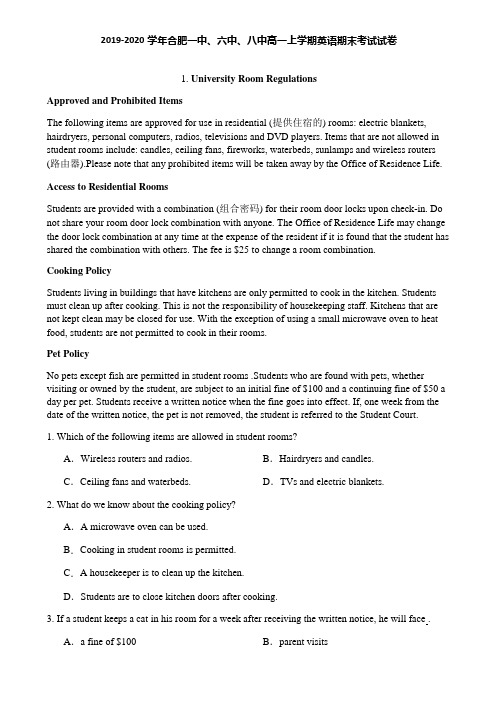
2019-2020学年合肥一中、六中、八中高一上学期英语期末考试试卷1. University Room RegulationsApproved and Prohibited ItemsThe following items are approved for use in residential (提供住宿的) rooms: electric blankets, hairdryers, personal computers, radios, televisions and DVD players. Items that are not allowed in student rooms include: candles, ceiling fans, fireworks, waterbeds, sunlamps and wireless routers (路由器).Please note that any prohibited items will be taken away by the Office of Residence Life.Access to Residential RoomsStudents are provided with a combination (组合密码) for their room door locks upon check-in. Do not share your room door lock combination with anyone. The Office of Residence Life may change the door lock combination at any time at the expense of the resident if it is found that the student has shared the combination with others. The fee is $25 to change a room combination.Cooking PolicyStudents living in buildings that have kitchens are only permitted to cook in the kitchen. Students must clean up after cooking. This is not the responsibility of housekeeping staff. Kitchens that are not kept clean may be closed for use. With the exception of using a small microwave oven to heat food, students are not permitted to cook in their rooms.Pet PolicyNo pets except fish are permitted in student rooms .Students who are found with pets, whether visiting or owned by the student, are subject to an initial fine of $100 and a continuing fine of $50 a day per pet. Students receive a written notice when the fine goes into effect. If, one week from the date of the written notice, the pet is not removed, the student is referred to the Student Court.1. Which of the following items are allowed in student rooms?A.Wireless routers and radios. B.Hairdryers and candles.C.Ceiling fans and waterbeds. D.TVs and electric blankets.2. What do we know about the cooking policy?A.A microwave oven can be used.B.Cooking in student rooms is permitted.C.A housekeeper is to clean up the kitchen.D.Students are to close kitchen doors after cooking.3. If a student keeps a cat in his room for a week after receiving the written notice, he will face .A.a fine of $100 B.parent visitsC.the Student Court D.a final warning2. I went climbing with a millennial(千禧一代).She is younger, fitter, braver and more energetic. I am good at getting discouraged, having a rest and giving advice from the sidelines. She will cling(附着于)on to a wall like a small monkey trying to escape certain death, while I will get near the top, realize how high that is and lose my nerve. Together we could make an impressive(感人的;令人钦佩的) team, me at the bottom of the wall, going, "That's great, try using your feet one by one. Oh...What did you do that for?" And her going, "Shall we try that again so we've actually done it? Do you think we should have warmed up first?"Climbing muscles, being the same as regular muscles, are use-it-or-lose-it. I climbed more often before I did the crazy running activity and used to think of the green runs at my local center as being for children, or for a warm-up. Now I find them extremely hard, and the purple is my top-of-the-tree, when in fact they are both for beginners, really. I suspect the millennial of avoiding the blue-with-red-spots just so as to not show me up.It wasn't her first time climbing, but she wasn't registered at the center, so she had to go through a process that sounds threatening: watching a video and answering questions on it (the answers are always "I am responsible for my own safety in the center" and Holds may spin"). In an older person-me, for instance-any activity that starts with a reflection on your own death is a little low-energy, whereas she seemed quite excited by it.We both laughed at each other's clothing: she accused me of having, a pink T-shirt which seemed too lovely for me, while she was dressed to be a labourer. The moral is that you can basically wear anything while you climb. It's not like running, where the ill-dressed are chased from the area by a thousand eyes.1. We learn from Paragraph 1 that the author and the millennial .A.know each other very well B.try to learn how to escape deathC.form a sharp contrast D.make a team that beats others2. By “climbing muscles, being the same as regular muscles, are use-it-or-lose-it” the author means______.A.climbing does good to musclesB.climbing needs practicing regularlyC.climbing muscles are as useful as other musclesD.climbing muscles won’t be lost even if not used3. The question the millennial was required to answer were admitted to .A.let the climbers realize the climbing might be dangerousB.give the climbers another approach to think of deathC.warn the climbers against loss of energy in the processD.remind the climbers of the importance of registration4. According to the passage, which of the following statements is true?A.Climbers need to wear special clothes.B.Ill-dressed runners stand out improperly.C.Climbers need to get a certificate before climbing.D.The author and millennial like making fun of others.3. In the animal kingdom, weakness can bring about aggression in other animals. This sometimes happens with humans also. But I have found that my weakness brings out the kindness in people. I see it every day when people hold doors for me, pour cream into my coffee, or help me to put on my coat. And I have discovered that it makes them happy.From my wheelchair experience, I see the best in people, but sometimes I feel sad because those who appear independent miss the kindness I see daily. They don’t get to see this soft side of others. Often, we try every way possible to avoid showing our weakness, which includes a lot of pretending. But only when we stop pretending we're brave or strong do we allow people to show the kindness that’s in them.Last month, when I was driving home on a busy highway, I began to feel unwell and drove more slowly than usual. People behind me began to get impatient and angry, with some speeding up alongside me, horning (按喇叭)or even shouting at me. At the moment I decided to do something I had never done in twenty-four years of driving. I put on the car flashlights and drove on at a really low speed.No more angry shouts and no more horns!When I put on my flashlights, I was saying to other drivers, “I have a problem here. I am weak and doing the best I can. And everyone understood. Several times, I saw drivers who wanted to pass. They couldn’t get around me because of the stream of passing traffic. But instead of getting impatient and angry, they waited, knowing the driver in front of them was in some way weak. Sometimes situations call for us to act strong and brave even when we don’t feel that way. But those are few and far between. More often, it would be better if we don’t, pretend we feel strong when we feel weak or pretend that we are brave when we are scared.1. People will feel happy, according to the author's findings, when __________.A.they offer their help to others B.they receive others’ helpC.they feel others’ kindness to them D.they show their weakness to other people 2. Why does the author feel sad sometimes?A.Because he has a soft heart, showing sympathy to others.B.Because he is disabled and relies much on others.C.Because some people pretend to be kind, but in fact they are not.D.Because some people fail to see the kindness in others.3. What did the other drivers do when they saw the flashlights?A.They sped up to pass because they didn’t want to wait.B.They stopped their cars to offer help.C.丁hey put on their flashlights too.D.They waited with patience.4. In this passage, the author advises us to _________.A.be independent of others and handle problems by ourselvesB.accept help from others for everythingC.admit our weaknessD.show our bravery4. Water is a necessity of life. Rain, especially, helps plants grow and stay green. But too much rain, especially in cities, can lead to flooding. That can cause waste water systems to overflow and send pollutants into rivers and other waterways. To fight the problem, several cities in the United States are starting programs like rooftop gardens.A team at the University of the District of Columbia in the nation's capital has created a garden on the top of one school building. The garden holds many kinds of plants to help absorb rainwater and grow food at the same time. Architect David Bell has designed five "green roofs" for the university. He says he is excited about the project because "it meant doing something more than just dealing with storm water management. It took advantage of a resource above the city and these flat roofs that aren't doing anything really became something that was about urban agriculture. " Rainwater is collected in large containers and sent through a system that waters the rooftop garden. The roof is filled with green life that appeals to insects.In cities, “you don't have that many spaces to choose from and so rooftops are just (unused) space," says Caitlin Arlotta. She is a student in the school's Urban Agriculture program. The project is part of a research program to see which plants do well on rooftops. The researchers are looking at plants including strawberries, tomatoes and sweet potatoes. The university also has other green spaces. "We also have our own farm experiments," A rlotta said. “ Within each of those growing systems, we want to be able to tell people which sorts of these crops grow the best. "Sandy Farber Bandier helps run UDC's Master Gardener program. It seeks to improve cities and make them beautiful by training people to become Master Gardeners. She says she's been surprised by the garden's output. ”My biggest surprise was that we produced 4, 250 pounds of produce the first year and was able to spread that to people in need. " She also likes being able to show people who live in D. C. and others beyond the nation's capital what and how food can be grown on a rooftop. “This is the future for food. You grow it here, you prepare it in a commercial kitchen, you distribute through farmers markets,food trucks, and then you recycle. "1. What do we know about the rooftop gardens?A.Rooftop gardens are very common in average neighborhoods.B.There are many sorts of plants there which help take in rainwater.C.They're playing an important role in the city's food supply.D.Rooftop gardens are no more than containers to collect rainwater.2. What can we infer from Paragraph 3?A.Rooftops can offer enough space to plant crops.B.Many plants like strawberries can grow well on rooftops.C.Some univercity students are participating in the Urban Agriculture program.D.The plants in rooftop gardens are attractive to many insects.3. How does Sandy Farber Bandier feel about the future of rooftop gardens?A.Confident.B.Doubtful.C.Worried.D.Ambiguous.4. What is the best title for the text?A.Rainwater Necessity for Plant LifeB.Green Roofs-The Future of Urban AgricultureC.The United States' Agriculture ProgramD.Rooftop Gardens-Food Paradise5. Last week the electricity in my flat went out. 1 My typical evening is spent watching TV and scrolling (滚动) through social media. Tonight this wasn’t possible. My roommate and I weren’t prepared with candles and matches. We just rely on electricity.So for me it was an early night, 2 That night, losing our electricity felt like losing a basic necessity, as basic as running water. But really, electricity is a luxury that we’ve grown to take for granted. I use electricity all the time, even when it’s not really necessary.3 And as I’m writing this, I have my lights on, even in the middle of the day when I don’t really need them.4 It contributes to global warming. It is harming our environment and we need to do what we can to stop it. Not only that, but if we continue to use the same large amount of energy, we will soon run out of it.How would we survive in a world without electricity? Our daily lives go around it. We wouldn’t be able to function. 5 So, shouldn’t we start preparing for it now? Cutting down on our use of electricity would save energy resources so that they could last for longer. And if everyone does it, we can make a big difference.6. On a raining day, I wen t to buy some aspirin. Upon entering a lady’s drugstore, I _________ that there was a keyboard on a music stand, leaning _________ the wall. Being a piano music lover and _________, I asked if the woman played. She nodded and added that she had been _________ lessons at age 60! I told her that it was very _________ that she was pursuing her passion to play the piano.Then she asked me ___________question. “I have been playing for 8 years now,” I answered.“Then you must play a song for me before you leave,” she _________. I thought she was joking and I simply smiled. At the end of the deal of the aspirin, she _______ me of our musical _______. She then showed me to an old upright piano in the living room, ________ asked me to play a song for her. I thought ________and decided to play David Lantz’s “Return to the Heart”, since she had so much passion for ________ and it was my soul-searching song.I played the song to the best of my ability, and with my emotions ________ into it as possible. She loved it. __________ I was about to step out of the door, I heard a weak voice calling out, “Young man!”I turned around. And there was an old lady __________ one little step at a time with the help of another woman. “I wanted to come out to __________ you for the beau tiful song that you played. I have been very sick, and it’s very hard for me to ________ my bed, but your music made me feel good”, she said. With that, she turned around and walked __________ back to her room.I was deeply ____________by her appreciation and felt a deeper understanding of the song. It served its purpose beautifully, returning to one’s ____________for peace and joy.1.A.spotted B.watched C.observed D.caught2.A.on B.at C.against D.over3.A.composer B.teacher C.player D.starter4.A.attending B.giving C.teaching D.reviewing 5.A.interesting B.rewarding C.moved D.impressive 6.A.another B.the same C.a different D.other7.A.advised B.ordered C.demanded D.requested 8.A.warned B.asked C.reminded D.required 9.A.course B.task C.discussion D.deal10.A.but B.and C.as a result D.what’s more 11.A.for the moment B.for a moment C.at the moment D.at a moment 12.A.music B.songs C.the piano D.aspirin 13.A.dropping B.falling C.pouring D.running 14.A.Since B.Because C.While D.As15.A.taking B.making C.having D.giving 16.A.admire B.thank C.pay D.owe17.A.get on B.get up C.get off D.get down18.A.quietly B.calmly C.normally D.slowly19.A.shocked B.touched C.delighted D.disturbed20.A.world B.brains C.heart D.dreams7. 阅读下面短文,在空白处填入适当的内容(1个单词)或括号内单词的正确形式。
安徽省合肥市一六八中学2019-2020学年高一上学期期末考试英语试卷(PDF版,无答案)
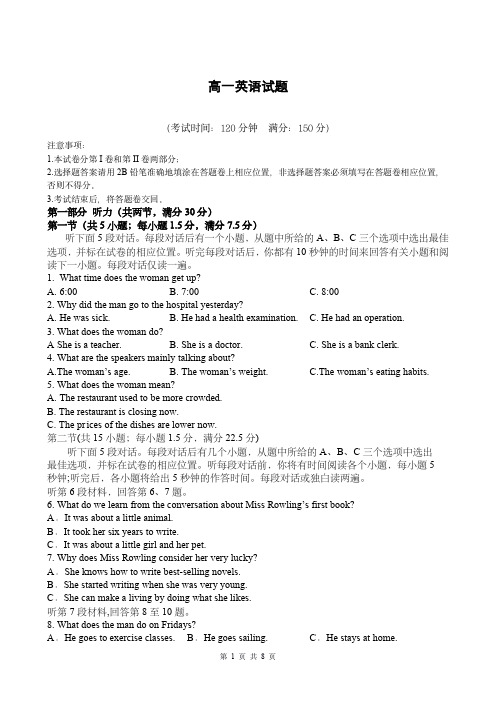
高一英语试题(考试时间:120分钟满分:150分)注意事项:1.本试卷分第I卷和第II卷两部分;2.选择题答案请用2B铅笔准确地填涂在答题卷上相应位置,非选择题答案必须填写在答题卷相应位置,否则不得分。
3.考试结束后,将答题卷交回。
第一部分听力(共两节,满分30分)第一节(共5小题;每小题1.5分,满分7.5分)听下面5段对话。
每段对话后有一个小题,从题中所给的A、B、C三个选项中选出最佳选项,并标在试卷的相应位置。
听完每段对话后,你都有10秒钟的时间来回答有关小题和阅读下一小题。
每段对话仅读一遍。
1.What time does the woman get up?A.6:00B.7:00C.8:002.Why did the man go to the hospital yesterday?A.He was sick.B.He had a health examination.C.He had an operation.3.What does the woman do?A She is a teacher. B.She is a doctor. C.She is a bank clerk.4.What are the speakers mainly talking about?A.The woman’s age.B.The woman’s weight.C.The woman’s eating habits.5.What does the woman mean?A.The restaurant used to be more crowded.B.The restaurant is closing now.C.The prices of the dishes are lower now.第二节(共15小题;每小题1.5分,满分22.5分)听下面5段对话。
每段对话后有几个小题,从题中所给的A、B、C三个选项中选出最佳选项,并标在试卷的相应位置。
2019-2020学年第一学期高一年级期末考试【英语试题+答案】
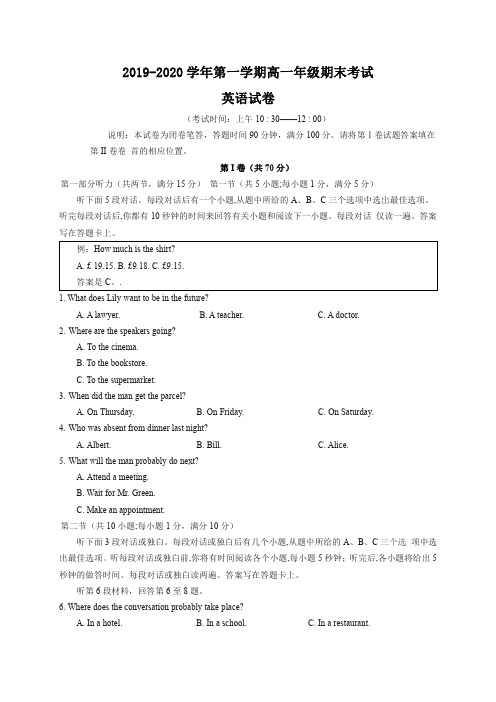
2019-2020学年第一学期高一年级期末考试英语试卷(考试时间:上午10:30——12:00)说明:本试卷为闭卷笔答,答题时间90分钟,满分100分。
请将第Ⅰ卷试题答案填在第II卷卷首的相应位置。
第I卷(共70分)第一部分听力(共两节,满分15分)第一节(共5小题;每小题1分,满分5分)听下面5段对话。
每段对话后有一个小题,从题中所给的A、B、C三个选项中选岀最佳选项。
听完每段对话后,你都有10秒钟的时间来回答有关小题和阅读下一小题。
每段对话仅读一遍。
答案写在答题卡上。
1.What does Lily want to be in the future?A.A lawyer.B.A teacher.C.A doctor.2.Where are the speakers going?A.To the cinema.B.To the bookstore.C.To the supermarket.3.When did the man get the parcel?A.On Thursday.B.On Friday.C.On Saturday.4.Who was absent from dinner last night?A.Albert.B.Bill.C.Alice.5.What will the man probably do next?A.Attend a meeting.B.Wait for Mr.Green.C.Make an appointment.第二节(共10小题;每小题1分,满分10分)听下面3段对话或独白。
每段对话或独白后有几个小题,从题中所给的A、B、C三个选项中选出最佳选项。
听每段对话或独白前,你将有时间阅读各个小题,每小题5秒钟;听完后,各小题将给出5秒钟的做答时间。
每段对话或独白读两遍。
答案写在答题卡上。
听第6段材料,回答第6至8题。
6.Where does the conversation probably take place?A.In a hotel.B.In a school.C.In a restaurant.7.How long will the man stay?A.For7days.B.For10days.C.For13days.8.What will the man do right now?A.Take a rest.B.Buy a guidebook.C.Go out to eat.听第7段材料,回答第9至11题。
2019-2020学年合肥市一六八中学高三英语上学期期末考试试题及参考答案

2019-2020学年合肥市一六八中学高三英语上学期期末考试试题及参考答案第一部分阅读(共两节,满分40分)第一节(共15小题;每小题2分,满分30分)阅读下列短文,从每题所给的A、B、C、D四个选项中选出最佳选项ASome young people win attention because of their good looks or their singing ability. A much smaller number gain fame because they have done something important and worthwhile with their abilities. Rishab Jain is among the latter. In 2018, 13-year-oldRishab developed a way to use AI technology to help pancreatic(胰腺的) cancer patients and won the3MYoung Scientist Challenge, a nationwide middle-school science competition, and its $25,000 prize.In the last stage of the contest, Rishab competed againstnine other finalists at the 3M Innovation Center(创新中心) in St.Paul,Minnesota. Leading up to the big meet, each finalist had partnered with a scientist to further develop their inventions.Rishab explains what led him to create his invention. First,a family friend died of cancer. Then Rishab learned about how deadly pancreatic cancer is, and that its low survival rate is due to how difficult it is to treat. "I'm also into programming, so I was learning about AI technology. I decided to try to solve a real-world problem using it."His winnings have been put in further research and in his nonprofit Samyak Science Society, which helps poor children enter the STEM (science, technology, engineering and math) education. Rishab is also raising awareness about pancreatic cancer. These efforts make him quite different from teenagers of his age. Considering becoming a biomedical engineer or a doctor一or both, he has also put some money aside to further his own learning. Almost certainly the doors of higher education will open wide to him before he even knocks.That's an outstanding outlook for one so young. Rashib is committed to helping very sick people in need. He is also providing teenagers of his age with a much-needed model of what kinds of things youth can achieve.1. What can we learn about the 3M Young Scientist Challenge in 2018?A. It was intended to solve medical problems.B. It was a nationwide AI competition for teenagers.C. It offered the finalists an opportunity to work with scientists.D. It allowed the finalists to learn AI technology in the 3M center.2. How did Rishab win the 3M Young Scientist Challenge?A.He showed excellent programming ability.B. He figured out the survival rate of pancreatic cancer.C. He introduced poor children to STEM education.D. He applied AI technology to treating pancreatic cancer.3. Which of the following best describes Rishab?A. Talented and caring.B. Independent and humorous.C. Responsible and patient.D. Polite and inspiring.BSonoma County is adding artificial intelligence to its wildfire fighting. The county has entered into an agreement with the South Korean firm Alchera to equip its network of fire-spotting cameras with software that detects wildfire activity and then issues a warning to authorities.The technology examines past and current images of terrain (地形;地势) and searches for certain changes, such as flames burning in darkness, said Chris Godley, the county’s director of emergency management. But emergency workers will first have to“teach”the system to distinguish between images that show fire smoke, and others that might show clouds, fog etc. The software will use feedback from humans to improve its algorithm(算法) and will eventually be able to detect fires on its own — or at least that’s what county officials hope.“It’s kind of like learning how to read,”Godley said. “What letters can I put together to make up a word?” The county activated the technology Wednesday and received 16 positive reports of smoke — all of which turned out to be permitted burns, he said. Once a seasonal ban on controlled burns goes into effect in April or May, the county plans to speed up the testing and feedback phase. The hope is that by November, the system will no longer need to be taught and can start providing reliable intelligence. Godley said. “It’s going to take us a while to make sure weget the bugs outand that we really can depend on it because ultimately this is a lifesaving mission.”The technology is intended to help officials investigate potential fire starts earlier so they can get personnel out to them more quickly and issue necessary warnings. Officials expect other places will adopt it if the technology is successful, particularly because it plugs into the camera network that’s already in place statewide.“We ultimately believe its potential could be realized in a year or two,” Godley said. “And it could really havea dramatic impact here in California.”4. What does the system first have to do before being put into work?A. Equip its network of fire-spotting cameras with software.B. Learn to tell between images of fire smoke and other pictures.C. Use feedbacks to improve its ability to detect fire independently.D. Examine images of the terrain and search for any possible changes.5. What do local officials expect the technology to accomplish?A. Be able to make positive reports of smoke.B. Be able to control seasonal burns in the area.C. Help them spot potential fire starts as soon as possible.D. Learn how to distinguish pictures of flames from clouds.6. What does the underlined part in paragraph 3 mean?A. kill all the bugs.B. get rid of mistakesC. provide reliable informationD. speed up testing process7. What does the author mainly intend to tell us?A. AI is creating a dramatic impact in California.B. AI is applied to monitor terrains in California.C. A new tool to help detect wildfire in California.D. A new way to put an end to wildfire in California.CIt was very cold and I had been watching a homeless man make himself comfortable in a “shelter” on the river bank. His “shelter” was a tarpaulin (油布)tied to rocks to keep the wind from blowing it away. He had been living there for over a month. I never saw him with warm clothing or food. I knew what I wanted to do.When I told my parents what I wanted to do they werealarmed. They said I could be putting myself at risk, taking a box to a homeless person at night! But I knew, in my deep heart, that I would be safe.I got a box. My parents watched as I added warm gloves, a heavy blanket ... into the box until it was full! Then, I put a Christmas card on top. It said, “Even though we hardly know each other, I want to wish you a Merry Christmas!” I put ten one-dollar bills inside it as well.My father insisted he went there with me as it was 10 pm on Christmas Eve. I said he could drive me but he had to stay in the car. He agreed.I took the box and walked towards his “house”. I called, “Sir, I have a Christmas box for you!”“Go away!” he shouted.“Sir,” I repeated.“Go away!” he shouted.“Why?” I asked him.He walked over and I expected to see an angry face. Instead I saw two of the most beautiful, gentle, blue eyes I have ever seen.“Merry Christmas!” I said.“Why are you doing this?” he asked.“Because you matter to me,” I said. With that I gave him the box.Tears came to his eyes and he thanked me. I got back to the car and watched him carry the box like it was filled with gold. I didn’t want to embarrass (使困窘) him by watching him any more so Dad and I left.8. The underlined word “alarmed” can best be replaced by _____.A. pleasedB. worriedC. disappointedD. surprised9. Why did the author ask his father to stay in the car?A. Because he wanted to prove he was brave.B. Because he believed the homeless man was bad.C. Because he wanted to protect his father from being hurt.D. Because he didn’t want the homeless man to feel bad.10. When the homeless man saw the author first, he was _____.A. quite angryB. very excitedC. quite puzzledD. very curious11. The author’s purpose in writing the text is to tell readers that _____.A. it is easier said than doneB. poverty is the mother of healthC. where there is a will, there is a wayD. a willing helper doesnot wait until he is askedD12. The five passes all include ________.A. a dinner cruiseB. a magic showC. a city tourD. a trolley ride13. Accordingto the rules and restrictions, ________.A. visitors can return their ticketsB. reservations cannot be cancelledC. passes cannot be shared among usersD. users can visit attractions more than once14. To make reservations, you can ________.A. write an e-mailB. make a phone callC. send a text messageD. fill out an online form15. In which section of a newspaper would you most likely find this advertisement?A. Leisure & TravelB. Health & BeautyC. Restaurants & FoodD. Sports & Entertainment第二节(共5小题;每小题2分,满分10分)阅读下面短文,从短文后的选项中选出可以填入空白处的最佳选项。
2019-2020学年安徽省合肥市六校高一上学期期末考试英语试题(解析版)
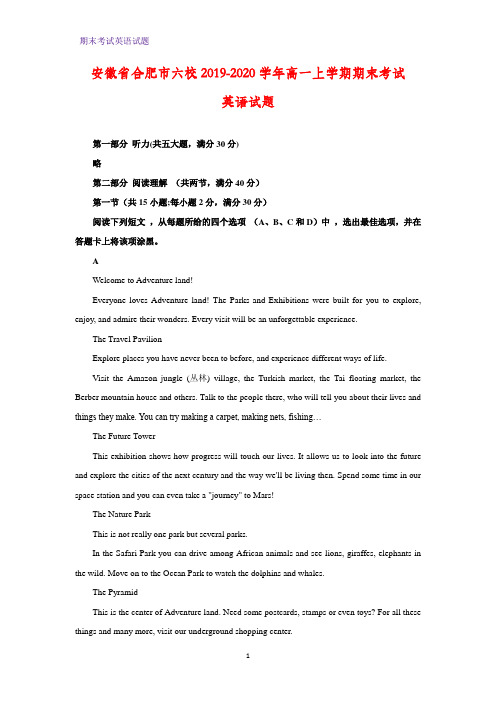
安徽省合肥市六校2019-2020学年高一上学期期末考试英语试题第一部分听力(共五大题,满分30分)略第二部分阅读理解(共两节,满分40分)第一节(共15小题;每小题2分,满分30分)阅读下列短文,从每题所给的四个选项(A、B、C和D)中,选出最佳选项,并在答题卡上将该项涂黑。
AWelcome to Adventure land!Everyone loves Adventure land! The Parks and Exhibitions were built for you to explore, enjoy, and admire their wonders. Every visit will be an unforgettable experience.The Travel PavilionExplore places you have never been to before, and experience different ways of life.Visit the Amazon jungle (丛林) village, the Turkish market, the Tai floating market, the Berber mountain house and others. Talk to the people there, who will tell you about their lives and things they make. You can try making a carpet, making nets, fishing…The Future TowerThis exhibition shows how progress will touch our lives. It allows us to look into the future and explore the cities of the next century and the way we'll be living then. Spend some time in our space station and you can even take a "journey" to Mars!The Nature ParkThis is not really one park but several parks.In the Safari Park you can drive among African animals and see lions, giraffes, elephants in the wild. Move on to the Ocean Park to watch the dolphins and whales.The PyramidThis is the center of Adventure land. Need some postcards, stamps or even toys? For all these things and many more, visit our underground shopping center.1. The Travel Pavilion is built to help visitors _____.A. realize the importance of travellingB. become familiar with mountain countriesC. learn how to make things such as fishing netsD. learn something about different places in the world2. If you are interested in knowing about what people’s life will be, you may visit _____.A. the Travel PavilionB. the Future TowerC. the Safari ParkD. the Pyramid3. If you want to get a toy lion to take home, where will you most likely go?A. The Pyramid.B. The Nature Park.C. The Future Tower.D. The Travel Pavilion.【答案』1. D 2. B 3. A解析这是一篇说明文。
2019-2020年高一上学期期末考试英语试卷 含答案
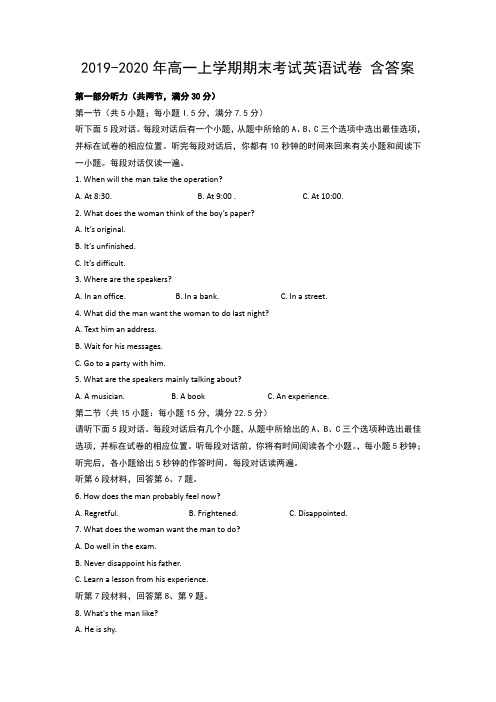
2019-2020年高一上学期期末考试英语试卷含答案第一部分听力(共两节,满分30分)第一节(共5小题;每小题I.5分,满分7.5分)听下面5段对话。
每段对话后有一个小题,从题中所给的A、B、C三个选项中选出最佳选项,并标在试卷的相应位置。
听完每段对话后,你都有10秒钟的时间来回来有关小题和阅读下一小题。
每段对话仅读一遍。
1. When will the man take the operation?A. At 8:30.B. At 9:00 .C. At 10:00.2. What does the woman think of the boy’s paper?A. It’s original.B. It’s unfinished.C. It’s difficult.3. Where are the speakers?A. In an office.B. In a bank.C. In a street.4. What did the man want the woman to do last night?A. Text him an address.B. Wait for his messages.C. Go to a party with him.5. What are the speakers mainly talking about?A. A musician.B. A bookC. An experience.第二节(共15小题:每小题15分,满分22.5分)请听下面5段对话。
每段对话后有几个小题,从题中所给出的A、B、C三个选项种选出最佳选项,并标在试卷的相应位置。
听每段对话前,你将有时间阅读各个小题。
,每小题5秒钟;听完后,各小题给出5秒钟的作答时间。
每段对话读两遍。
听第6段材料,回答第6、7题。
6. How does the man probably feel now?A. Regretful.B. Frightened.C. Disappointed.7. What does the woman want the man to do?A. Do well in the exam.B. Never disappoint his father.C. Learn a lesson from his experience.听第7段材料,回答第8、第9题。
安徽省合肥一中、六中、八中2020-2021学年高一上学期期末英语试题

I decided to go home early that day. In the halt I met the lady who brought us cookies eveiy Friday. She was a little woman with gray hair. Only her head and the top of her green apron were visible over the cart(/J、车)loaded with cleaning supplies. At least she had a job!
I decided to do sometluiig for her. I wrote to a newspaper expressing how I felt about tlie unselflslmess of tlie Cookie Lady who needed a job・ A few days later, my article appealed in the newspaper and the Cookie Lady was allowed to stay in her position. On the same day, I received a letter, wliich seemed so unlikely that I read it twice・ An editor of a local niagazme likes your piece and wants you to call her next time you are lookmg for work."
安徽省合肥市2019-2020学年高一上学期期末考试英语试卷(含答案)

安徽省合肥市2019-2020学年高一上学期期末考试英语试卷(含答案)英语试题(满分:150分考试时间:120分钟)温馨提示:1.答卷前,考生务必用黑色字迹的钢笔或签字笔将自己的姓名、班级、准考证号填写在答题卡上,并且用2B铅笔把对应的准考证号涂黑。
2.选择题每小题选出答案后,用2B铅笔把答题卡上对应题目的答案标号涂黑;如需改动,用橡皮擦干净后,再选择其它答案;不能答在试卷上。
3.非选择题必须用黑色字迹的钢笔或签字笔作答,答案必须写在另发的答题卡各题目指定区域内的相应位置上;如需改动,先划掉原来的答案,然后再写上新的答案;不准使用铅笔和涂改液,不按以上要求作答的答案无效。
4.考生必须保持答题卡的整洁,考试结束后,将答题卷和答题卡一并收回。
第一部分听力(共五大题,满分30分)第一节(共5小题;每小题 1.5分,满分7.5分)听下面5段对话。
每段对话后有一个小题,从题中所给的A、B、C三个选项中选出最佳选项,并标在试卷的相应位置。
听完每段对话后,你都有10秒钟的时间来回答有关小题和阅读下一小题。
每段对话仅读一遍。
1. What time is it now?A.11:15.B.10:30.C.10:15.2. How will the speakers pay?A. They’ll use coins.B. They’ll use a card.C. They’ll use a note.3. What will the speakers do?A. See a doctor.B. Go back home.C. Visit Jean.4. What does the man like about the new restaurant?A. The atmosphere.B. The food.C. The service.5. What are the speakers talking about?A. Which seats they will choose.B. How soon the performance will begin.C. Whether there are tickets for the concert.第二节(共15小题;每题 1.5分,满分22.5分)听下面5段对话或独白。
安徽省合肥市第一六八中学2020学年高一英语上学期期末考试试题(含解析)
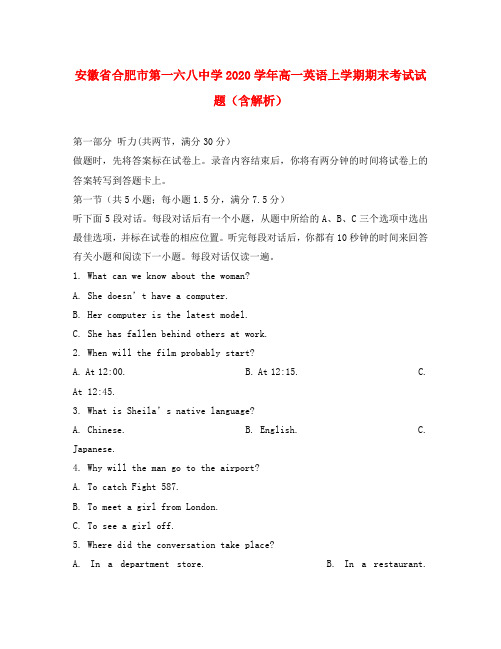
安徽省合肥市第一六八中学2020学年高一英语上学期期末考试试题(含解析)第一部分听力(共两节,满分30分)做题时,先将答案标在试卷上。
录音内容结束后,你将有两分钟的时间将试卷上的答案转写到答题卡上。
第一节(共5小题;每小题1.5分,满分7.5分)听下面5段对话。
每段对话后有一个小题,从题中所给的A、B、C三个选项中选出最佳选项,并标在试卷的相应位置。
听完每段对话后,你都有10秒钟的时间来回答有关小题和阅读下一小题。
每段对话仅读一遍。
1. What can we know about the woman?A. She doesn’t have a computer.B. Her computer is the latest model.C. She has fallen behind others at work.2. When will the film probably start?A. At 12:00.B. At 12:15.C.At 12:45.3. What is Sheila’s native language?A. Chinese.B. English.C.Japanese.4. Why will the man go to the airport?A. To catch Fight 587.B. To meet a girl from London.C. To see a girl off.5. Where did the conversation take place?A. In a department store.B. In a restaurant.C. In a hotel.第二节(共15小题;每小题1.5分,满分22.5分)听下面5段对话或独白。
每段对话或独白后有几个小题,从题中所给的A、B、C三个选项中选出最佳选项,并标在试卷的相应位置。
听每段对话或独白前,你将有时间阅读各个小题,每小题5秒钟;听完后,各小题将给出5秒钟的作答时间。
2019-2020年高一上学期期末统考英语试题 含答案

2019-2020年高一上学期期末统考英语试题含答案本试卷分第一卷(选择题)、第二卷(非选择题)两部分,满分120分,考试时间为100分钟。
注意事项:1、请考生务必将姓名、班级、准考证号准确填写在卷首。
2、请考生务必将准考证号、考试科目用铅笔准确涂在答题卡上。
涂卡时请对应题号。
第I卷(选择题共90分)I 听力(共15小题,满分15分)第一节(共5小题;每小题1分,满分5分)听下面5段对话,从A,B,C三个选项中选出最佳选项,每段对话仅读一遍。
1. What will the two speakers buy next?A. A jacketB. A handbag.C. A watch.2. What is the weather like now?A. Hot.B. Cool.C. Cold.3. What do the two speakers hope to do?A. Stop young people from smoking.B. Advise people not to smoke.C. Stop cigarette production.4. What is the most probable relationship between the two speakers?A. Mother and son.B. Hostess and guest.C. Waitress and customer.5. Where does the man’s brother probably work now?A. At the post office.B. In a language school.C. In a publishing house. 第二节(共10小题;每小题1分,满分10分)听下面对话,从A,B,C三个选项中选出最佳选项,每段对话读两遍。
听第6段材料,回答第6至第8题。
6. What are the two speakers going to do?A. Visit Mark together.B. Eat in a restaurant.C. Do the shopping.7. What time is it probably now?A. 5:50 pm.B. 6:00 pm.C. 6:30 pm.8. What feature will probably help the man recognize the woman?A. She wears glasses.B. She is wearing a gray dress.C. She has long black hair.听第7段材料,回答第9和第11题。
合肥一中、六中、八中2019-2020 学年第一学期高一期末考试英语试卷+答案
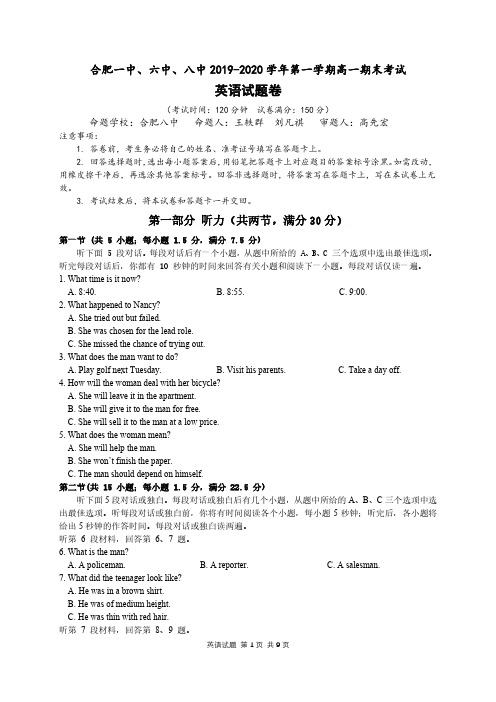
合肥一中、六中、八中2019-2020学年第一学期高一期末考试英语试题卷(考试时间:120分钟试卷满分:150分)命题学校:合肥八中命题人:王轶群刘凡祺审题人:高先宏注意事项:1. 答卷前,考生务必将自己的姓名、准考证号填写在答题卡上。
2. 回答选择题时,选出每小题答案后,用铅笔把答题卡上对应题目的答案标号涂黑。
如需改动,用橡皮擦干净后,再选涂其他答案标号。
回答非选择题时,将答案写在答题卡上,写在本试卷上无效。
3. 考试结束后,将本试卷和答题卡一并交回。
第一部分听力(共两节,满分30分)第一节 (共 5 小题;每小题 1.5 分,满分 7.5 分)听下面 5 段对话。
每段对话后有一个小题,从题中所给的 A、B、C 三个选项中选出最佳选项。
听完每段对话后,你都有 10 秒钟的时间来回答有关小题和阅读下一小题。
每段对话仅读一遍。
1. What time is it now?A. 8:40.B. 8:55.C. 9:00.2. What happened to Nancy?A. She tried out but failed.B. She was chosen for the lead role.C. She missed the chance of trying out.3. What does the man want to do?A. Play golf next Tuesday.B. Visit his parents.C. Take a day off.4. How will the woman deal with her bicycle?A. She will leave it in the apartment.B. She will give it to the man for free.C. She will sell it to the man at a low price.5. What does the woman mean?A. She will help the man.B. She won’t finish the paper.C. The man should depend on himself.第二节(共 15 小题;每小题 1.5 分,满分 22.5 分)听下面5段对话或独白。
安徽省合肥市2019-2020学年高一上学期期末考试英语试卷(含答案)
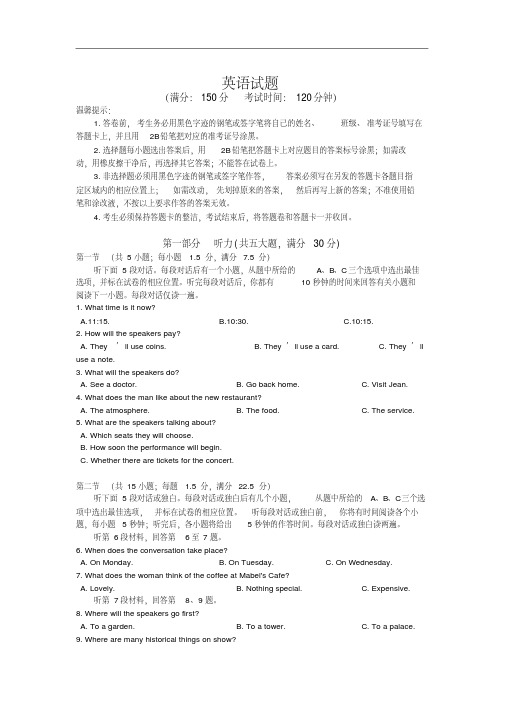
英语试题(满分:150分考试时间:120分钟)温馨提示:1.答卷前,考生务必用黑色字迹的钢笔或签字笔将自己的姓名、班级、准考证号填写在答题卡上,并且用2B铅笔把对应的准考证号涂黑。
2.选择题每小题选出答案后,用2B铅笔把答题卡上对应题目的答案标号涂黑;如需改动,用橡皮擦干净后,再选择其它答案;不能答在试卷上。
3.非选择题必须用黑色字迹的钢笔或签字笔作答,答案必须写在另发的答题卡各题目指定区域内的相应位置上;如需改动,先划掉原来的答案,然后再写上新的答案;不准使用铅笔和涂改液,不按以上要求作答的答案无效。
4.考生必须保持答题卡的整洁,考试结束后,将答题卷和答题卡一并收回。
第一部分听力(共五大题,满分30分)第一节(共5小题;每小题 1.5分,满分7.5分)听下面5段对话。
每段对话后有一个小题,从题中所给的A、B、C三个选项中选出最佳选项,并标在试卷的相应位置。
听完每段对话后,你都有10秒钟的时间来回答有关小题和阅读下一小题。
每段对话仅读一遍。
1. What time is it now?A.11:15.B.10:30.C.10:15.2. How will the speakers pay?A. They’ll use coins.B. They’ll use a card.C. They’ll use a note.3. What will the speakers do?A. See a doctor.B. Go back home.C. Visit Jean.4. What does the man like about the new restaurant?A. The atmosphere.B. The food.C. The service.5. What are the speakers talking about?A. Which seats they will choose.B. How soon the performance will begin.C. Whether there are tickets for the concert.第二节(共15小题;每题 1.5分,满分22.5分)听下面5段对话或独白。
2019-2020学年合肥市第一中学高三英语上学期期末试题及答案

2019-2020学年合肥市第一中学高三英语上学期期末试题及答案第一部分阅读(共两节,满分40分)第一节(共15小题;每小题2分,满分30分)阅读下列短文,从每题所给的A、B、C、D四个选项中选出最佳选项AAre you looking for somewhere special to go this weekend? Do you want to try something new?Check out one of these hot new restaurants.Fast BestFast food doesn't have to be junk food, as this café proves. Do you fancy a really good hamburger made with the best ingredients, or old-fashioned fish and chips fried to perfection, all on the table in super-quick time? Speed and quality are important here, and the prices aren't bad either.Your Local Caff (小餐馆)Remember when cafés served full English breakfasts—sausages, beans, fried bread, bacon and eggs—with a strong cup of tea? Well, this place still does and you can have your breakfast at any time you like during the day while you listen to your favourite tunes from the 1980s.Last Days of the RajA centrally located Indian restaurant, perfect for eating before or after the cinema or a show. In summer enjoy your meal in the beautiful garden. The most popular dishes are lamb and chicken cooked with mild, medium or hot spices. For brave customers there is extra hot!The Chocolate BoxThe owner of this small café used to cook all kinds of food, but then she realised she preferred desserts to anything else. If you want meat or fish, don't come here. They only do desserts! Lots of different kinds of sweets. Chocolate lovers will be excited by the range of chocolate cakes.1.Fast Best suits a person ______.A.who has a sweet toothB.who loves spicy foodC.who wants to have good breakfastD.who gets 30 minutes off for lunch2.Which is true about Last Days of the Raj?A.You can listen to great music in it.B.It serves hot food with pepper.C.It serves an all-day breakfast.D.It is prefect for vegetarians.3.Which restaurant serves only desserts and sweets?A.Fast Best.B.Your Local Caff.st Days of the Raj.D.The Chocolate Box.BIn the U. S., speaking more than one language fluently is not very common except in Los Angeles, California.The city has one of the largest population in the U. S. of young people between the ages of 18 and 34. This generation is often called millennials (新千年一代). More than half of millennials in Los Angeles are bilingual (双语的), which means they speak more than one language.Maria Elena Burgos is cooking a Mexican breakfast. She says making Mexican food is just one of the many traditions in her home. Another is speaking Spanish to her children.“We want them to be bilingual. We want to keep the Spanish somewhere in their learning too, not only at home.”When Ms Burgos first came to the United States from Mexico, she learned English. She knew her children would learn English quickly. So she wanted them to speak Spanish at home and study the language at school.She says being bilingual will give them more opportunities in the future. Knowing Spanish also means the children can talk with their s in Mexico.“When we had our children, one of the decisions we as parents made was to name them with a name that was easily pronounced in English and Spanish.”Elizabeth wants to know her family’s culture.” “The culture-to go back to our roots because that’s part of who we are.”Monica wants to pass on the culture to her children“It’s nice to know our culture and then to be able to pass it onto our children and grand-children and everyone to let them know where we come from.”And, Monica says she does not speak only English and Spanish. She has even learned some Korean in school.4. Which of the following is a tradition of Maria?A. Cooking breakfast for her s.B. Talking with her children in Spanish.C. Talking with her s in Spanish.D. Forcing her children to speak Spanish.5. What can be inferred from Monica’s words?A. She doesn’t care where she comes from.B. She looks forward to learning Spanish.C. Everyone should know his own culture.D. She doesn’t like American culture.6. Which of the following is mentioned about children speaking more languages?A. It can give children more chances in the future.B. It can make children feel proud before their friends.C. It can give the children a chance to go to a good college.D. It can let children go to the places where they want to go.7. What’s the main purpose of this passage?A. To entertain the readers with a funny story.B. To inform the readers of a shocking experiment result.C. To encourage more persons to learn a second language.D. To tell a truth that many people in Los Angeles are bilingual.CNowadays organic food hasbecome a fashion. Organic food sales reached a record of $ 45.2 billion in 2017, making it one of the fastest-growing parts of American agriculture. Some people may buy organic food for these reasons like resource cycling and biodiversity, but most people may choose organic food because they think it's healthier. While a small number of studies have shown relationships between eating organic food and reducing risks of being ill, no studies, up to now, have answered the question whether eating organic food can improve health.According to the United States Department of Agriculture(USDA), organic food does not suggest anything about health. In 20155 Miles McEvoy, then chief of the National Organic Program for the USDA, refused to admit any health benefits of organic food, saying the question has nothing to do with the National Organic Program. Instead, the USDA thinks that organic refers to a production method that increases cycling of resources keeps ecological balance, and protects biodiversity.I'm an environmental health scientist who has spent over 20 years studying pesticides that do harm to human beings. Several years ago, I was part of the study on whether an organic diet can reduce pesticide exposure. This study focused on a group of pesticides which have always been harmful to children's brain development. We found that children who ate traditional diets had nine times higher exposure to these pesticides than children who ate organic diets.Last month, I published a small study that suggested a path forward to answering the question whether eating organic food actually improves health. My study got a lot of attention. While the results were novel, they didn't answer the big question. As I toldThe New York Timesin 2003, “What does this really mean for the safety of my kids? But we don't know. Nobody does. It was true then, and it's still true now.”8. Why do most people prefer to buy organic food?A. For its health benefits.B. For biodiversity.C. For its delicious taste.D. For resource cycling.9. What does the USDA suggest about organic food?A. It can improve people's health.B. It is produced in an environment-friendly way.C. It can reduce risks of being ill.D. It has nothing to do with the National Organic Program.10. What can be concluded from the author's study?A. Pesticides don't harm children's brain.B. Traditional diets benefit people's health.C. Organic diets can reduce pesticide exposure.D. The results are meaningful to children's safety.11. What is the best title for the text?A.What Is Organic Food?B. Is Organic Food Healthier?C. How Should We Avoid Pesticides?D. What Are the Benefits of Organic Food?DIn ancient times, Chinese used plant leaves or bird feathers as a fan during the summer time. This was the earliest form of the fan. The first real fan was made back in the era of Yao and Shun period thousands of years ago. Since then,Chinese-made fans have become a vital part of Chinese art and culture. At the beginning, the fan functioned as a tool to generate a current of air in the hot weather. Now electric fans such as ceiling fans and other technological breakthroughs have taken the place.Long ago, fans caught the attention of ancient Chinese artists by chance. Thereafter, a unique fan art gradually took shape in the history of Chinese culture. Fan art usually includes Chinese calligraphy, paintings, or poems on the sectors(扇区). Special skills are needed to write or paint on them.Due to its history and partly because of its unique shape, Chinese would soon develop the tradition of using fans as ornaments(装饰品). Fans are made in different sizes and different color1 s to meet the needs of each request. Other Chinese ornaments, such as the Chinese knot, the green jade, and the Spring Festival picture, are often combined in each design.The value of fans depends mainly on the materials used and the level of craftsmanship that is involved duringthe process. Feather, paper, jade, bamboo and silk have all been used as ideal materials to make fans. Ancient Chinese even made iron fans to serve as deadly weapons(武器)in Chinese martial arts. Fans made by famous craftsmen are often characterized by pretty designs and detailed workmanship, and thus become favorites of collectors. Fans with masterpiece fine art like calligraphy or paintings are even more valuable.12.What is the first paragraph mainly about?A. The origin of fans.B. The materials of fans.C. The popularity of fans.D. The production of fans.13. Why do Chinese use fans as ornaments?A. They are made of valuable materials.B. They reflect the beauty of Chinese culture.C. They convey literature works on the sectors.D. They are often combined with other ornaments.14. Which of the following makes a fan favored by most collectors?A. Its advanced function.B. Its complex character.C. Its artistic handicraft.D. Its various applications.15. What can we infer about the fan from the text?A. Chinese send fans to their friends as gifts.B. Chinese ornaments can meet different requests.C. Traditional fans have lost their functional value.D. The fan plays different roles with the change of time.第二节(共5小题;每小题2分,满分10分)阅读下面短文,从短文后的选项中选出可以填入空白处的最佳选项。
- 1、下载文档前请自行甄别文档内容的完整性,平台不提供额外的编辑、内容补充、找答案等附加服务。
- 2、"仅部分预览"的文档,不可在线预览部分如存在完整性等问题,可反馈申请退款(可完整预览的文档不适用该条件!)。
- 3、如文档侵犯您的权益,请联系客服反馈,我们会尽快为您处理(人工客服工作时间:9:00-18:30)。
合肥一中、六中、八中2019-2020学年高一上学期英语期末考试试卷(考试时间:120分钟试卷满分:150分)第一部分听力(共两节,满分30分)第一节 (共 5 小题;每小题 1.5 分,满分 7.5 分)1. What time is itnow?A. 8:40.B. 8:55.C. 9:00.2. Whathappened toNancy?A. She tried outbut failed.B. She was chosen for the lead role.C. She missed the chanceof trying out.3. Whatdoes the man want to do?A.Playgolf nextTuesday.B.Visithis parents.C.Takea dayoff.4. How will the woman deal with herbicycle?A. She will leave it in the apartment.B.She willgive itto the man for free.C. She willsell it to theman ata low price.5. Whatdoes the woman mean?A. She willhelp the man.B. She won’t finish the paper.C. The man should depend on himself.第二节(共 15 小题;每小题 1.5 分,满分 22.5 分)听第6段材料,回答第6、7 题。
6. What is the man?A.Apoliceman.B.A reporter.C.Asalesman.7. Whatdid the teenager look like?A.He was in abrown shirt.B.He was of mediumheight.C.He was thin with red hair.听第7段材料,回答第8、9 题。
8. Wheredoes theconversation probablytake place?A.Ata station.B.Atatheatre.C.Ata shop.9. Whatdoes the woman tell the man to do?A.Addhis name to the mailing list.B.Book thetickets in advance.C.Get the headphones tomorrow.听第8段材料,回答第10 至12 题。
10. Whatare the speakers mainlydiscussing?A.The effects ofstress.B. The ways of relaxation.C. Theideasof healthylife.11. Whatdoes the woman sayaboutcomputergames?A. I t’s no goodplaying them long.B.She feels ithard to playthem. C.Sometimes they’r e relaxing.12. Whatdoes the woman suggest the man do?A. Keep a petdog.B. Have a good rest.C.Dooutdoor activities.听第9段材料,回答第13 至16 题。
13. Whatare the speakers mainlytalking about?A.Cartoon characters.B.Climate change.C.Pollution controlagreements.14. Whatencouraged the man to create Mr.Carbon?A.His dreamof making a movie.B.His concern about industrialpollution.C.His disappointmentatsome government s’ inactivity.15. Whathas Mr.Carbon done?A.He has arousedpeople’s concern about climate change.B.Hehasplayed a role in a disastermovie.C.He hasmade abox officesuccess.16. Whatkind of person isMrs. Green?A. She is climate-ignorant.B. She is an energysaver.C.She iswealthy.听第10 段材料,回答第17 至20题。
17. Whyis Bettina living with the speake r’s familyin Porchester?A. She hasa job there.B. Sheis studying there.C.Her father is in hospital there.18.Howdid the speaker feelwhen Bettina firstarrived?A. She was happyto have Bettina stay.B. She envied Bettina’s goodlooks.C. She thoughtBettina was hard-working.19. Whatdo we knowaboutBettina?A. She takescare ofher father.B. She often helps inJade’shouse.C. She works part-time in a cinema.20. What worries the speaker?A.Bettina’s dad is badlyill.B.Herparents disbelieve her.C. She can’tgetalong with Bettina.第二部分阅读理解(共两节,满分40分)第一节(共15小题;每小题2分,满分30分)阅读下列短文,从每题所给的四个选项(A、B、C和D)中,选出最佳选项。
AUniversityRoomRegulationsApproved andProhibited ItemsThefollowing items are approved for use in residential (提供住宿的) rooms:electricblankets, hairdryers, personalcomputers, radios, televisions and DVDplayers.Items thatare notallowed in student rooms include:candles, ceiling fans, fireworks, waterbeds, sunlamps and wireless routers (路由器).Please note thatanyprohibited items willbe taken awaybythe Office ofResidence Life.Access toResidentialRoomsStudents are provided with acombination (组合密码) fortheir roomdoor locks uponcheck-in. Do notshareyourroomdoorlockcombinationwithanyone.TheOfficeofResidenceLifemaychangethedoorlock combination atanytime at the expenseof the resident if it is found that the studenthasshared the combination with others.The fee is $25 to changea roomcombination.CookingPolicyStudents living in buildings thathave kitchensare onlypermitted to cook in the kitchen. Students must clean up aftercooking.This is not the responsibilityof housekeeping staff. Kitchens thatare notkeptclean maybe closed for use.With the exception of using asmallmicrowave oven to heat food, students are not permitted to cook in their rooms.PetPolicyNo pets except fish arepermitted in student rooms .Students who are found with pets,whethervisiting or owned bythe student, aresubject to an initial fine of$100 and a continuing fine of$50 a dayperpet. Students receive a written notice when the fine goes intoeffect. If, one week fromthe date of the written notice, the pet is not removed, the student is referred to the StudentCourt.21.Which of the followingitems are allowed in student rooms?A.TVs andelectric blankets. B.Hairdryers and candles.C.Ceiling fans and waterbeds. D.Wireless routers and radios.22.Whatdo weknowabout the cooking policy?A.Students are to close kitchen doors aftercooking.B.Cooking in student rooms is permitted.C.Ahousekeeper is to clean up the kitchen.D.Amicrowave oven can be used.23.If a studentkeepsa cat in his roomfor a week after receiving the written notice, he will face.A.afine of$100 B.theStudentCourtC.parentvisits D.afinal warningBIwentclimbing with a millennial(千禧一代).She is younger, fitter, braverand more energetic. Iam good atgetting discouraged,having a restandgiving advice fromthe sidelines. She willcling(附着于)onto awalllikeasmallmonkeytryingtoescapecertaindeath,whileIwillgetnearthetop,realizehowhighthatis andlosemynerve.Togetherwecouldmakeanimpressiveteam,meatthebottomofthewall,going, "That's great,tryusingyourfeetonebyone.Oh...Whatdid youdothatfor?"Andhergoing,"Shallwetrythatagain so we've actuallydone it?Do you think we should have warmed up first?"Climbing muscles,beingthe sameas regularmuscles,are use-it-or-lose-it. Iclimbed moreoftenbefore Ididthecrazyrunningactivityandusedtothinkofthegreenrunsatmylocalcenterasbeingforchildren,or for awarm-up. NowIfind themextremelyhard, and the purple is mytop-of-the-tree,when infact theyare both for beginners, really.Isuspect the millennialof avoiding the blue-with-red-spots justso as to notshow me up.Itwasn'ther first time climbing, butshewasn't registered at the center, so she had to go through a process thatsounds threatening: watching a video andanswering questions on it (the answers are always "I amresponsible for myown safetyin the center"and Holds mayspin").In an olderperson-me, forinstance-anyactivitythatstartswithareflectiononyourowndeathisalittlelow-energy,whereassheseemed quite excited byit.We both laughedateach other's clothing:she accused me ofhaving, a pinkT-shirt which seemed too lovelyforme,whileshewasdressedtobealabourer.Themoralisthatyoucanbasicallywearanythingwhile you climb. It's notlike running, where the ill-dressed are chased fromthe area bya thousand eyes.24.We learn fromParagraph 1 that the authorand the millennial.A.knoweach otherverywell B.forma sharp contrastC.tryto learn how to escape death D.make a teamthatbeats others25.By“c limbingmuscles,beingthesameasregularmuscles,areuse-it-or-lose-it”theauthormeans.A.climbing does good to musclesB.climbing muscles are asusefulas othermusclesC.climbing needspracticing regularly D.climbingmuscles won’tbe losteven if notused26.The question the millennial was required to answerwere admitted to.A.remind the climbers ofthe importance of registrationB.give the climbers anotherapproach to think of deathC.warn theclimbers against lossof energyin the processD.let the climbers realize the climbingmightbe dangerous27.According to the passage, which of the following statements istrue?A.Theauthor and millennial like making fun of eachother.B.Ill-dressed runners standout improperly.C.Climbers need to geta certificate before climbing.D.Climbers need to wearspecialclothes.CIntheanimalkingdom,weaknesscanbringaboutaggressioninotheranimals.Thissometimeshappens with humans too. ButIhavefound that myweakness brings out thekindness in people. Isee iteveryday when peoplehold doors forme, pourcreamintomycoffee, orhelp me to puton mycoat.AndIhave discovered that itmakes themhappy.From mywheelchair experience, Isee the best in people,butsometimesIfeelsad because those who appear independentmiss the kindness Isee daily.Theydon’tget to see this softside ofothers.Often, we try everywaypossible to avoidshowing our weakness, which includes a lotof pretending. Butonlywhen westop pretending we're braveor strong do we allowpeopleto showthe kindness that’s in them.Lastmonth,whenIwasdrivinghomeonabusyhighway,Ibegantofeelunwellanddrovemoreslowly thanusual.Peoplebehindmebegantogetimpatientandangry,withsomespeedingupalongsideme,horning(按喇叭)oreven shouting atme.At the momentIdecided to do something Ihad neverdone in twenty-four years ofdriving. Iputon the car flashlights and drove onata reallylowspeed.No more angryshouts and no more horns!WhenIputonmyflashlights,Iwassayingtootherdrivers,“Ihaveaproblemhere.Iamweakanddoing thebestIcan.”Andeveryoneunderstood.Severaltimes,Isawdriverswhowantedtopass.Theycouldn’tgetaround me becauseof the streamof passing traffic. But instead ofgetting impatientand angry, theywaited, knowing the driver in frontof themwas in some wayweak.Sometimessituationscallforustoactstrongandbraveevenwhenwedon’tfeelthatway.Butthoseare fewandfarbetween.More often,itwouldbebetterifwedon’tpretendwefeelstrongwhenwefeelweakor pretend that we are brave when we are scared.28.People will feelhappy,according to theauthor's findings, when .A.theyreceive other s’he lp B.theyoffer their help to othersC.theyfeelother s’k indness to them D.theyshowtheir weakness to otherpeople 29.Whydoes the author feelsad sometimes?A.Because hehas a softheart, showing sympathy to others.B.Because he is disabledand relies much on others.C.Because some people pretend to be kind, but in facttheyare not.D.Because some people fail to see the kindness inothers.30.Whatdid the otherdrivers do when theysaw the flashlights?A.Theywaited with patience.B.Theystopped their cars to offerhelp.C.Theyputon their flashlights too.D.Theysped up to passbecause theydidn’t want to wait.31.In this passage, the author advises us to .A.be independentof othersand handle problems byourselvesB.accepthelp fromothers for everythingC.admitour weaknessD.showour braveryDWater is a necessityof life. Rain, especially, helps plantsgrowand staygreen. But too much rain, especiallyincities,canleadtoflooding.Thatcancausewastewatersystemstooverflowandsendpollutants intoriversandotherwaterways.Tofighttheproblem,severalcitiesintheUnitedStatesarestartingprograms like rooftop gardens.Ateamat the Universityof the Districtof Columbia in the nation's capitalhas created a gardenon the topofoneschoolbuilding.Thegardenholdsmanykindsofplantstohelpabsorbrainwaterandgrowfoodat the same time.ArchitectDavid Bellhas designed five "green roofs"for the university. He says he is excited abouttheprojectbecause"itmeantdoingsomethingmorethanjustdealingwithstormwatermanagement.It took advantage ofaresourceabove the cityand these flat roofs thataren'tdoing anything reallybecame something that was abouturban agriculture. "Rainwateris collected in large containers and sent through a systemthat watersthe rooftop garden.The roof is filled with green life thatappeals to insects.Incities,“youdon'thavethatmanyspacestochoosefromandsorooftopsarejust(unused)space,"says CaitlinArlotta. She is a student in the school's UrbanAgriculture program.The project is partof a research programtoseewhichplantsdowellonrooftops.Theresearchersarelookingatplantsincludingstrawberries, tomatoes and sweetpotatoes.The universityalso has othergreen spaces.“Wealso have ourown farm experiments,"Arlottasai d. “Withineachofthosegrowingsystems,wewanttobeabletotellpeoplewhich sorts of these crops grow thebest. ”SandyFarberBandierhelpsrun UDC's MasterGardenerprogram. Itseeks to improvecities and make thembeautifulbytrainingpeopletobecomeMasterGardeners.Shesaysshe'sbeensurprisedbythegarden's output. ” Mybiggestsurprise was that we produced 4, 250poundsof produce the firstyearand was able to spreadthattopeopleinneed."ShealsolikesbeingabletoshowpeoplewholiveinD.C.andothersbeyondthe nation's capital whatand how food can begrown onarooft op. “This is the future for food.Yougrow it here, you prepare it in a commercialkitchen, you distribute through farmers markets, food trucks, and then you recycle. "32.Whatdo weknowabout the rooftop gardens?A.Rooftopgardens are verycommon in average neighborhoods.B.Rooftopgardensare nomore than containers to collect rainwater.C.They're playing an important role in the city's food supply.D.Thereare manysorts ofplants there which help takein rainwater.33.Whatcan we infer fromParagraph 3?A.Rooftopscan offerenough space toplantcrops.B.Manyplants like strawberries can grow wellon rooftops.C.Some universitystudents are participating in the UrbanAgriculture program.D.Theplants in rooftop gardens are attractive to manyinsects.34.Howdoes SandyFarberBandier feelabout the future of rooftop gardens?A.Confident. B.Doubtful. C.Worried. D.Ambiguous.35.What is the best title for the text?A.RainwaterNecessityfor PlantLifeB.GreenRoofs-The Futureof UrbanAgricultureC.TheUnited States'Agriculture ProgramD.RooftopGardens-Food Paradise第二节(共5小题;每小题2分,满分10分)根据短文内容,从短文后的选项中选出能填入空白处的最佳选项。
